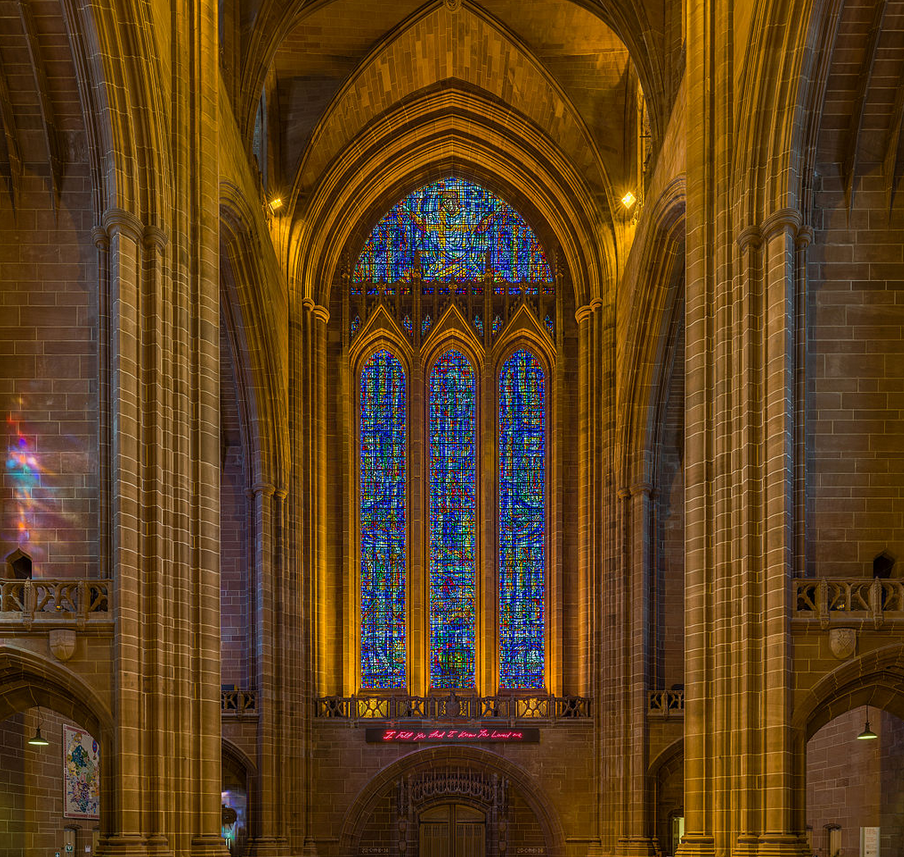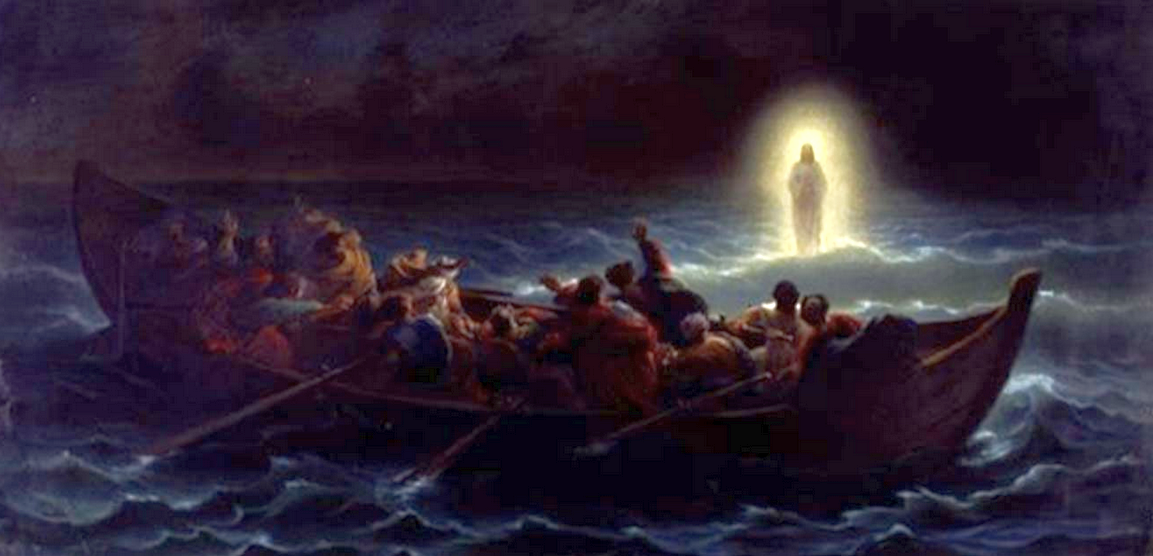
Editor’s note: The following sermon by Robert Stuart MacArthur is extracted from The World’s Great Sermons, Vol. IX, compiled by Grenville Kleiser (published 1908).
What think ye of Christ.—Matt. xxii., 42.
The ideal man has not yet been discovered. Humboldt, who traveled far, saw much and felt more, recorded in his diary this sentence, “The finest fruit earth holds up to its maker is a man.” It is here implied that this finest fruit is the ideal man. But Humboldt did not affirm that he had ever found this man. The ideal man has not yet been discovered among those who were mere men. No one of our noblest men was a spotless sun; no one reached sinless perfection. From all our loftiest specimens of manhood I turn dissatisfied to Jesus Christ, and in Him I find the ideal becomes actual, the dream real, and the hope fruition. What Mount Tabor is, rising abruptly in its unique symmetry and beauty from the northeastern arm of the plain of Esdraelon, that Jesus Christ is, rising in insulated grandeur and spotless perfection above the plain reached by the noblest men of all the centuries.
What Mount Blanc as the king of the Alps is, lifting its crystal domes and towers 15,781 feet above the level of the Mediterranean Sea, compared with the other snow-clad and cloud-kissed mountains of the Alps, that Jesus Christ is compared with the loftiest men who have risen as mountain heights above their fellows through all the ages. What the Himalaya range, the most elevated and stupendous mountain system on the globe, sweeping across historic lands as far as from New York to Chicago and back to New York, and rising so high that the superb Matterhorn, if lifted bodily and placed upon the Jungfrau, would not reach the glittering Himalaya heights, that and more Jesus Christ is to the long line of men who have risen highest in mortal grandeur in the history of the human race. Jesus Christ is the pearl and crown of humanity; He is the loftiest specimen of manhood the race has produced; he is the fullest manifestation of divinity God has given the world; He is the effulgence of God’s glory, and the very image of His substance. He rises in unapproachable glory, not only above men, but also above saints and seraphs, and above angels and archangels. Gazing upon Him, we can exclaim with inexpressible enthusiasm and unutterable ecstasy, “Ecce Homo!” and with the same breadth and with equal truth we can also reverently exclaim, “Ecce Deus!”
The setting of this text is instructively suggestive. For some time in His discussion with the Pharisees, our Lord had been acting on the defensive. Both Sadducees and Pharisees had been asking Him questions. His answers put the Sadducees to silence, and their confusion greatly gratified the Pharisees. It is now their turn to experience similar confusion from the celerity and dexterity of His replies. Never was there so skillful a debater as Jesus Christ. He was masterful in His clarity of thought, simplicity of speech, and purity of motive.
In the case before us, He passes from the defensive to the offensive, and he convicts Scribes and Pharisees of entertaining false views of the Messiah. They had disputed His claims as a spiritual Messiah, and He now shows the irreconcilable contradiction between their views of Him as a mere worldly Messiah, and the teaching of their own prophetic Scriptures. They were silenced and even stunned by His rapid, aggressive, and unanswerable attack. We are significantly told that “no man was able to answer him a word, neither durst any man from that day forth ask him any more questions.”
It must, doubtless, be admitted that there are men in every community, who have no definite convictions regarding Jesus Christ. It seems almost incredible that in a community of culture and Christianity men and women should be found who have not reached definite conclusions regarding the person and character of Christ. I put then the question with the utmost directness, “What think ye of Christ?” This is the broadest, deepest, and loftiest question ever put to the human race. This is the question of all the ages. This question virtually engaged the thought of Abraham; it evoked a response from Moses; and it stirred the deepest emotions and loftiest praise of David, as he swept his lyre and sang his immortal songs….
In this congregation there are no hearers unwilling to admit that Jesus Christ is at least a great historic character. They frankly admit that He was born at Bethlehem, brought up at Nazareth, and crucified at Jerusalem. They are entirely correct in the outward features of His earthly career, but they have comparatively little conception of the spiritual significance of His wonderful life and His vicarious death.
They think of the historical elements of His Wonderful life as they would think of those of Buddha, Zoroaster, or Mohammed. Their conception of His earthly life has no power over the development of their own lives, except as a mere character of history. They fail to see that His was a unique life, and that it was lived on earth by Him, that it might be lived in some measure over again on earth by us. They fail to see that He became the Son of man, that we might become the sons of God. They do not learn that He revealed the fatherhood of God and the brotherhood of man that we should sweetly experience the one and constantly illustrate the other. The historic Christ has no more power over the practical lives of some, than the traditional heroes of classic legend. Virtually for them there is no Christ or God. Practically for them there is no historic Christ. Until the historic Christ is translated into a personal Savior and Master, controlling our acts, our words, and our thoughts by His matchless example, His unique personality, and His spiritual purity, there is for us no historic Christ worthy the name.
There are those who think of the Christ as a dreamy, sentimental, and poetic character. They are charmed by the commendable characteristics of His remarkable life. They refer to Him in terms of soothing speech and of dreamy affection. There is an element of poesy in all their conceptions of the divine-human Christ. They think of Him in language which the robust Chalmers called, in his lofty scorn, “nursery endearments.” They are ready to adopt the language of the renowned French theologian, eminent Orientalist, and brilliant rhetorician, Renan, when he speaks of the Christ of God as the “sweet Galilean.” Such epithets must be utterly unwelcome to Christ. If He be not more than man, then He is less than man. If He be not worthy of our loftiest devotion, He is certainly worthy of our severest reprehension. In a word, if He be not God, He is not a good man.
Carlyle described materialism as a “gospel of dirt”; we might fittingly describe this sweet and silly sentimentalism as a “gospel of gush.” Only as we bow down at Christ’s feet, and worship Him as the divine-human Man, can we give Him the honor which He merits and demands. Then we can employ and sanctify the loftiest poetry in chanting His praise, the noblest art in limning His person, and the profoundest logic in urging His claims upon men as the divine-human Savior. There are many who are willing to admit and who earnestly affirm that Jesus Christ is the ideal man of the human race. They are ready to declare that it was a glorious thing that man was originally made like God, and that it was a still more condescending thing that God was made like man. The Christ was indeed the ideal man of the human race. He was the great exemplar, the perfect model, the sublime original to be imitated by all true men and women. In Him, and in Him only, the plant of humanity blossomed and bloomed into a perfect flower.
But how can we account for the perfection of His humanity, if we deny the reality of His divinity? We ought, as students of literature and life, to account for Jesus the Christ. We strive to account for Socrates and Plato, for David and Isaiah, for Paul and Luther, for Washington and Gladstone, for Lincoln and McKinley. Are we not under the strongest possible obligations to account for Jesus Christ? Men say that Jesus Christ was good, but that He was not God. Out of their own mouths these men convict themselves of inconsistency in their locutions and illogicality in their reasonings. If Jesus Christ be not God, He is not good. He is either an unpardonable egotist, or a hopeless lunatic, or he is the Christ of God, and God over all, blessed forever more. He claimed to be God, and if His claim be not true, how can he be good? The stream of His life flowed through the human race on a higher level, and rose to a vastly higher point, than any other stream known to human history or divine revelation. How shall we account for the height to which that stream rose? Water can never rise higher than its source. If that source were simply human, how can we account for the superhuman height which it reached? If we admit the account given in the gospels of His virgin birth and divine origin, all His life is easily explicable.
But if we deny His unique origin, we can not logically account for His unique life. A life began as was never another life, we might expect to see continue as no other life continued. A naturally skeptical man finds it easier to admit the account of Christ’s remarkable birth than to attempt to explain His remarkable life if He deny the remarkable birth. The unicity of His birth we would naturally expect to eventuate in the unicity of His life. His life can not be explained on any principle of heredity. We readily admit the royal element in His blood, although the fortunes of His family had fallen before His birth; but no law of heredity will account for the physical attractiveness, the mental superiority, and the moral purity of Jesus, the Christ. Neither will environment account for His marvelous career and character. What was there in the peasant conditions of His family life to produce the uniqueness of His manhood? Neither will education account for the Christ. He was never in school, in the technical sense of that term, although He doubtless studied in the village synagogue; and yet He rose above all the limitations, traditions, and bigotries by which He was surrounded. It is doubtful if He ever sat at the feet of the greatest rabbis of the time. It is certain that He never studied at the feet of the philosophers of Greece and Rome, nor of the dreamy Orient. He never traveled, except possibly barely across the confines of Palestine, a country about the size of the State of New Hampshire. How came He to emancipate Himself from the sectarianism and sectionalism of His country and century? How came He to be the contemporary of all the ages? How came He to utter in the Sermon on the Mount truths which socially and religiously the foremost thinkers of to-day can barely understand, and dare not fully apply to the solution of the problems of the hour? No mere human thinker has ever approached the Sermon on the Mount. But in pure spirituality of thought, our Lord surpassed it in His last address to His disciples. This address bears the ineffaceable marks of His supreme divinity and absolute deity. O, ye critics, I ask you as a problem of literature and life to account for Jesus the Christ. I ask no favors for Him. It is you that need the favors, if you oppose the Christ. I demand for Him simple justice. “What think ye of the Christ?”
Dr. Geikie, in his “Life of Christ,” calls attention to the fact that the Jews confess great admiration for the character and words of Jesus; that the Mohammedan world gives Him the high title of Messiah; that the myriad-minded Shakespeare paid Him lowly reverence, and that men like Galileo, Kepler, Bacon, Newton, and Milton set the name of Christ above every other name. He also reminds us that Jean Paul Richter, whom his countrymen call “Der Einzige,” the unique, tells us that “the life of Christ concerns him who, being the holiest among the mighty, the mightiest among the holy, lifted with his pierced hands empires off their hinges, and turned the stream of centuries out of its channel, and still governs the ages.” Spinoza, the great philosopher, son of Portuguese Jews, disciple of Aben-Ezra and Descartes, calls Christ the symbol of divine wisdom. Schelling and Hegel speak of Him as the union of the divine and human. The immortal Goethe, the acknowledged prince of German poets, and one of the most superbly accomplished men of the eighteenth century, says, “I esteem the gospels to be thoroughly genuine, for there shines forth from them the reflected splendor of a sublimity, proceeding from the person of Jesus Christ, of so divine a kind as only the divine could ever have manifested upon earth.”
What thinkest thou of the Christ, O Jean Jacques Rousseau, with all the brilliancy of thy intellect, the singularity of thy character, and the enthusiasm of thy writings? Give place to the witness Rousseau; hear his testimony. Rousseau speaks: “How petty are the books of the philosophers, compared with the gospels! Can it be that writings at once so sublime and so simple are the work of men? Can He whose life they tell be Himself no more than a mere man?… Yes, if the death of Socrates be that of a sage, the life and death of Jesus are those of a God.” What thinkest thou of the Christ, burly, brusque, brave, and heroic Thomas Carlyle, with all thy marvelous reading, thy profound thinking, and thy contempt of cant and love of truth? Carlyle steps forward and speaks: “Jesus of Nazareth, our divinest symbol! Higher has the human thought not yet reached.” Let us summon Dr. Channing, the cultured and eloquent preacher and writer, the foremost man among American Unitarians in his day. What thinkest thou, O Channing, of Jesus Christ? He makes reply: “The character of Jesus Christ is wholly inexplicable on human principles.”
What thinkest thou, O Herder, illustrious German thinker, broad scholar, and exquisite genius, of Jesus, the Christ? Superb is his reply: “Jesus Christ is in the noblest and most perfect sense the realized ideal of humanity.” What thinkest thou of the Christ, O Napoleon, mighty son of Mars, striding through the world like a Colossus, darkening the brightness of noonday with the smoke, and lighting the darkness at midnight with the fires of battle? Hear this man of gigantic intellect, whatever may be said of his moral motives: “I think I understand somewhat of human nature, and I tell you all these (the heroes of antiquity) were men, and I am a man, but not one is like Him; Jesus Christ was more than man. Alexander, Cæsar, Charlemagne, and myself founded great empires; but upon what did the creations of our genius depend? Upon force. Jesus alone founded His empire upon love, and to this very day millions would die for him.” Compared with such witnesses as these, the opponents of Jesus Christ of to-day are pygmies so contemptible in mentality and so questionable in morality as to be ruled out of every court of testimony, where intellectual ability and moral worth have weight.
I summon thee, O execrable Judas. Behold him flinging down the thirty pieces of silver before the chief priests and elders. Hear him speak in his agony of soul: “I have sinned in that I have betrayed the innocent blood.” I summon thee, O Pontius Pilate, with thy immortality of shame in the creeds of the ages. The Roman Procurator washes his hands. Strange sight! He speaks: “I am innocent of the blood of this just person.” He speaks again: “I find no fault in this man.” I summon John, the heroic Baptist. Hear His testimony: “Behold the Lamb of God, who taketh away the sin of the world.” O loving and divine John, the Evangelist, what thinkest thou of the Christ? “He is the Vine, the Way, the Truth, the Light, and the Word, and the Word was God.” I summon thee, O matchless Paul. What is thy testimony? “He is the image of the invisible God…. The blessed and only Potentate, the King of kings, the Lord of lords.” I summon thee, Apostle Peter, once confessor, then denier, but afterward penitent witness and heroic martyr. What is thy testimony? “He is the Christ, the Son of the living God.” I summon thee, O once doubting but always brave Thomas. Hear the testimony of this witness as he falls at the Master’s feet and exclaims, “My Lord and my God!”
I summon thee, O John Bunyan, immortal tinker; thy glorious Pilgrim, marching through the ages, telling the story of redeeming love, is thy testimony to the character of thy Lord. I summon thee, O Charles Spurgeon, and the testimony of all thy volumes, of thy glorious life and of thy peerless ministry is that “Jesus Christ is the chiefest among ten thousand and the One altogether lovely.” I summon thee, O De Wette, great Biblical critic of Germany: “This only I know, that there is salvation in no other name than in the name of Jesus Christ, the crucified.” I summon thee, O scholarly, cultured MacIntosh; the attendants are watching thy last moments, they bend over thee to catch thy last whispers: “Jesus, love!—Jesus, love!—The same thing.” I might summon ten thousand more, who from the Grassmarket in Edinburgh, and from a thousand racks and stakes went up to glory and to God, and their testimony would be, “None but Jesus, none but Jesus.” I summon thee, Toplady, and hear thee sing this great hymn, “Rock of Ages, cleft for me.”
I summon thee, O Tennyson, immortal laureate, thou who hast fought thy doubts and found divine help. Let us hear the result of thy conflicts:
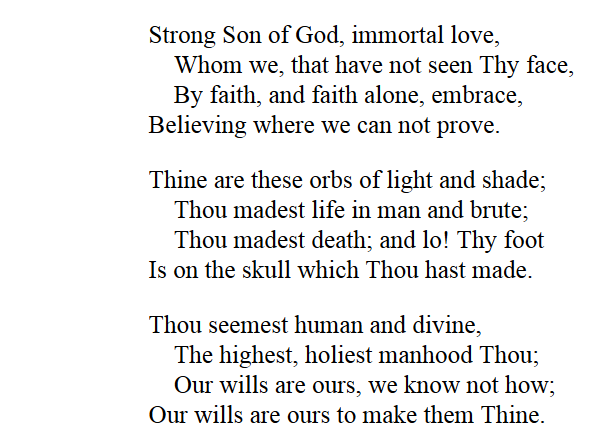
I summon thee, O Browning, poet of divine optimism and interpreter of the deeper instincts of the human heart, let us hear the conclusion of thy philosophic mind:

I summon thee, O Gladstone, noblest of statesmen, uncrowned king of the world, thou who didst come in contact with the throbbing life of the world, of politics, letters, and religions, what sayst thou concerning humanity’s greatest need? “I am asked what a man should chiefly look to in his progress through life as to the power that is to sustain him under trials and enable him manfully to confront his afflictions. I must point to something which, in a well-known hymn is called, ‘The old, old story,’ and taught with an old, old teaching, which is the best gift ever given to mankind. The older I grow, the more confirmed I am in the belief that Jesus Christ is the only hope of humanity.”
I summon Thyself, O Thou Christ of God, Thou holiest of the holy, Thou who art God of very God. What sayst Thou of Thyself? “Before Abraham was I am.” “I and my Father are one.” “He that hath seen me, hath seen the Father.”

Sermon: Christ – The Question of the Centuries
Latest from Religion

The Weimar Years – Part 1
This started out as an attempt to better understand Weimar Germany by chronicling my reactions to the audiobook version of “The Weimar Years: Rise and Fall 1918-1933” by Frank McDonough. Writing my
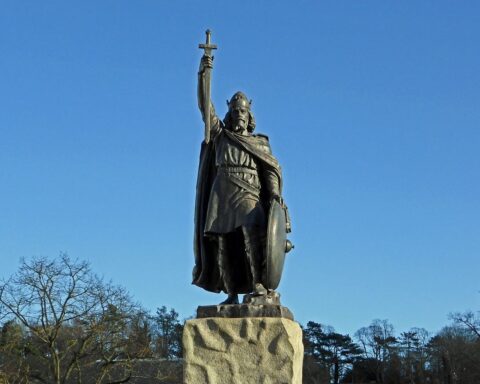
Alfredus Rex Fundator
"Alfred was a Christian hero, and in his Christianity he found the force which bore him, through calamity apparently hopeless, to victory and happiness."
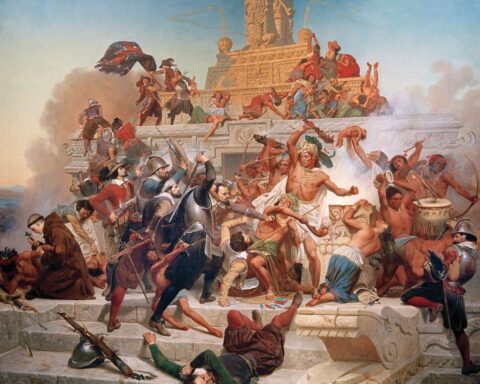
The Story of Cortez
It seemed to me that, having to speak tonight to soldiers, that I ought to speak about soldiers. Some story, I thought, about your own profession would please you most and teach
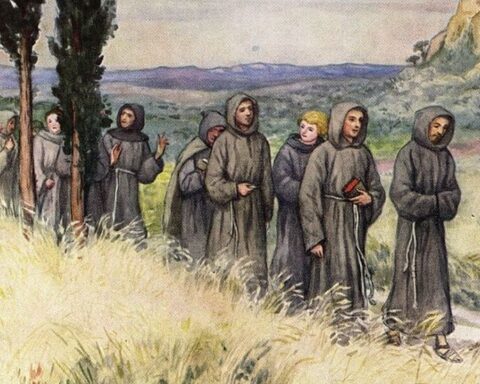
The Coming of the Friars
When King Richard of England, whom men call the Lion-hearted, was wasting his time at Messina, after his boisterous fashion, in the winter of 1190, he heard of the fame of Abbot
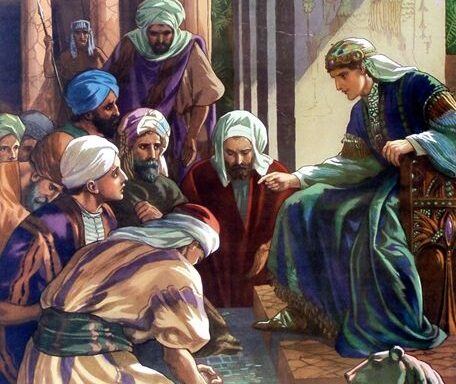
“Joseph” by Charles Kingsley
Editor’s note: The following is extracted from The Works of Charles Kingsley, Vol. 25 (published 1885). (Preached on the Sunday before the Wedding of the Prince of Wales. March 8th, third Sunday


